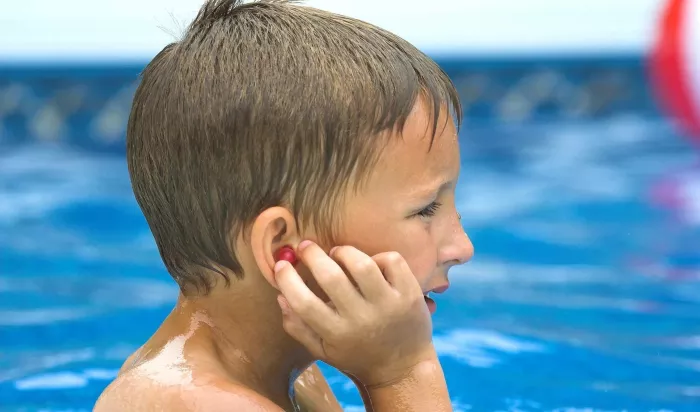Swimming is a fun activity for people of all ages. But if you or your child has ear tubes, you might wonder if it’s safe. Ear tubes are small devices placed in the eardrum to help with ear infections and fluid buildup.
This article will explain everything you need to know about swimming with ear tubes. You’ll learn about risks, safety tips, and expert recommendations.
What Are Ear Tubes?
Ear tubes, also called tympanostomy tubes, are tiny cylinders placed in the eardrum. They help drain fluid and allow air into the middle ear. Doctors often recommend them for:
- Frequent ear infections
- Fluid buildup that doesn’t go away
- Hearing loss caused by fluid
The tubes usually fall out on their own after 6 to 18 months.
Is Swimming Safe with Ear Tubes?
Yes, swimming is generally safe with ear tubes. However, you need to take precautions to keep water out of the ears.
Risks of Swimming with Ear Tubes
Water entering the ear can sometimes cause:
- Infections
- Discomfort
- Drainage from the ear
But with proper care, these risks can be minimized.
Expert Recommendations for Swimming
Most doctors agree that swimming is fine with ear tubes. However, they suggest different rules based on water depth.
Surface Swimming (Pools, Lakes, Ocean)
For surface swimming, ear protection isn’t always needed. But some doctors recommend:
- Using earplugs
- Wearing a swim cap
- Avoiding dirty water
Diving or Deep Swimming
Deeper water increases pressure, which can push water into the ears. For diving or underwater swimming:
- Use waterproof earplugs
- Avoid jumping in headfirst
- Dry ears thoroughly after swimming
Best Ear Protection for Swimming
If you want extra protection, consider these options:
1. Custom-Fit Earplugs
These are made to fit your ears perfectly. They block water effectively but can be expensive.
2. Silicone Putty Earplugs
Soft and moldable, these are affordable and easy to use.
3. Swim Bands or Caps
A snug swim cap can help keep water out. Some come with built-in ear covers.
How to Keep Ears Dry While Swimming
Even with earplugs, some water might get in. Here’s how to dry ears safely:
- Tilt your head to let water drain
- Use a towel to gently dry the outer ear
- Avoid inserting cotton swabs
When to Avoid Swimming
There are times when swimming should be avoided:
- Right after tube placement (wait until the doctor says it’s okay)
- If there’s active ear drainage or infection
- In untreated natural water (lakes, rivers) with high bacteria levels
Signs of an Ear Infection After Swimming
Watch for these symptoms:
- Ear pain
- Fluid leaking from the ear
- Hearing changes
- Fever
If you notice these, see a doctor right away.
Tips for Parents of Kids with Ear Tubes
If your child has ear tubes, follow these tips:
- Teach them not to dive deep
- Use ear protection if recommended
- Check ears after swimming
- Follow up with the doctor as needed
What Doctors Say About Swimming with Ear Tubes
Most ENT (ear, nose, and throat) specialists agree:
- Shallow swimming is low-risk
- Earplugs help but aren’t always required
- Avoid dirty or untreated water
Always follow your doctor’s specific advice.
Alternative Water Activities
If you’re worried about swimming, try:
- Water play without full submersion
- Using a shower instead of swimming
- Enjoying splash pads
How to Clean Ears After Swimming
Keeping ears clean is important. Here’s how:
- Rinse with fresh water.
- Dry gently with a towel.
- Use a hairdryer on low heat (held at a distance).
Never insert objects into the ear canal.
Conclusion
Swimming with ear tubes is usually safe if you take precautions. Use ear protection if needed, avoid dirty water, and dry ears well afterward. Always follow your doctor’s advice for the best results.
By following these tips, you or your child can enjoy swimming without worry. Stay safe and have fun in the water!
Frequently Asked Questions
Can bathwater affect ear tubes?
Bathwater is usually fine, but avoid dunking the head underwater.
Do ear tubes hurt when swimming?
No, swimming shouldn’t hurt if done safely.
How long after ear tube surgery can you swim?
Most doctors recommend waiting 1-2 weeks.
Related topics:
What Causes Wrinkles in Front of Ears?
What will happen 10 years after buccal fat pad removal surgery?
What happens if you leave breast implants in longer than 10 years?

